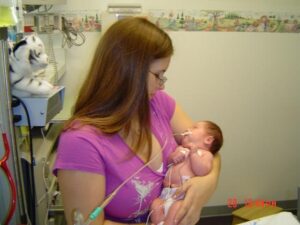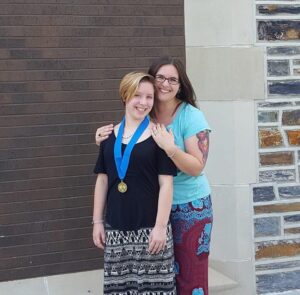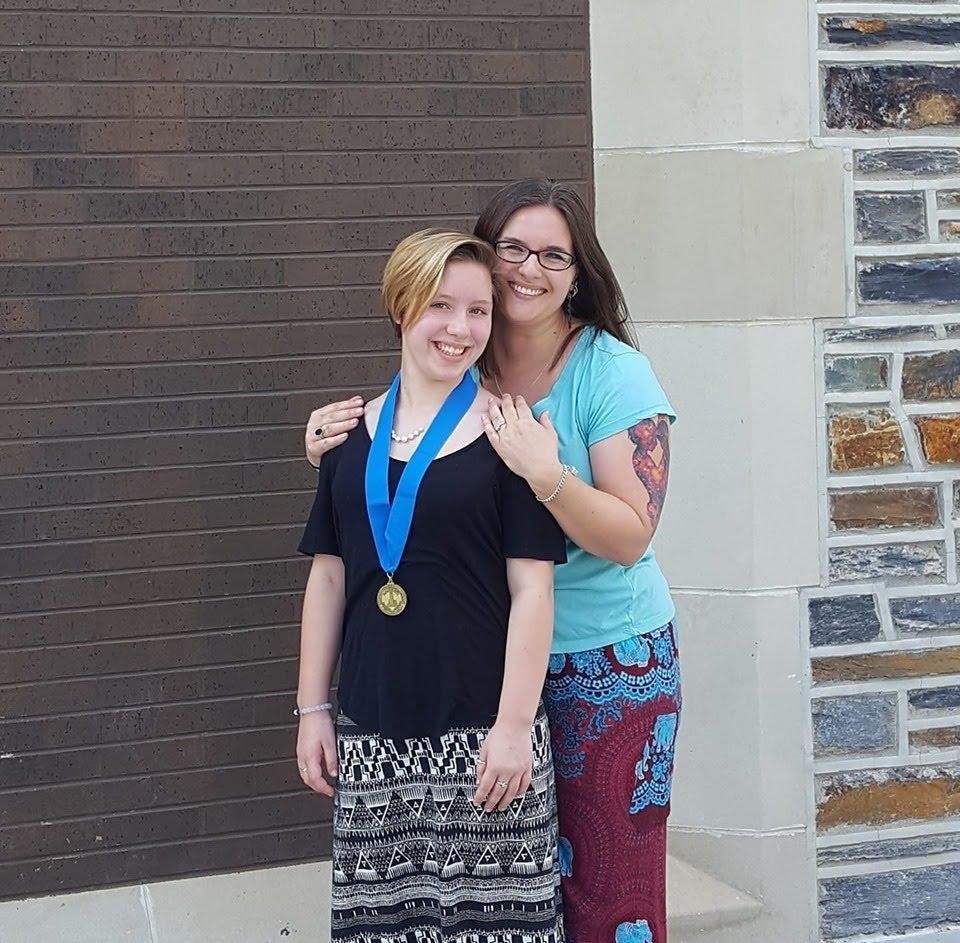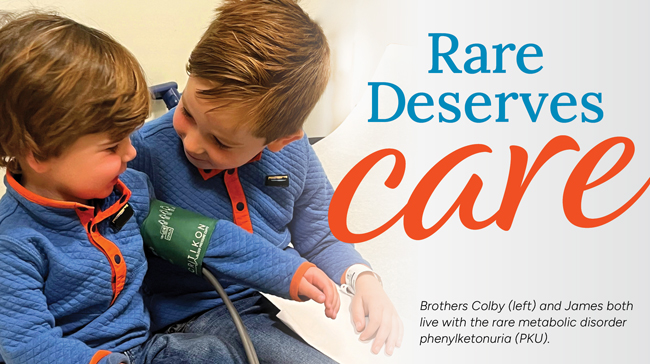The following story was submitted by Kayte and Ashley in honor of July’s Rare Spotlight, Gastroschisis. In this story, Kayte and Ashley reflect on their journey with the condition.
When I received my daughter Ashley’s gastroschisis diagnosis in 2005, there were no options available for support. This was my first pregnancy and I was young (21) and had never heard of this condition before. I remember feeling scared and confused but wanting more information to know what to expect for my child and how to make sure she would be okay. However, when I went online there was a paucity of accessible research, much of which was outdated, and no options to connect with other families. I was devastated, and certain that I was alone in the universe. 
Fortunately, I located one online blog written by the mother of a little girl who also had gastroschisis and was just a few years older than Ashley. That blog gave me so much hope, because I knew that if that child was ok, mine might be too. This was also where I first learned about NORD, as there was a fundraising link embedded in the page. It was exciting to know that not only were there other children with gastroschisis, but there was also an organization that was supporting rare disease research such as this. For my daughter’s first birthday, I held my first fundraiser for NORD and was able to link any donations in her name directly to their gastroschisis fund. Since then, the fund has grown from just a few thousand dollars to over fifteen thousand dollars – we still need more to be able to fund a research grant.
Throughout the years I have learned so many things while on this journey with my child. I started out just talking to other families on the internet who needed support, and eventually found myself in an advocacy role which led to co-founding Avery’s Angels with Meghan Hall-Rauen, the only gastroschisis-specific support organization available worldwide. I have been fortunate enough to travel to Spain to speak to doctors about the needs of our families, to attend meetings with legislators to discuss research funding, to represent our community at conferences, and most importantly to meet some of the most amazing families across the globe. One of my greatest joys is seeing all of the gastro green tattoos that people have to commemorate their children. The awareness ribbon is green because Meghan and I chose it from a box of crayons in our living room several years ago. It’s incredible to have a tangible reminder of how small efforts can have far-reaching ripple effects. I’ve seen the joy of countless families when their babies finally leave the NICU, and sat with many as they struggled through multiple setbacks. I’ve watched some of our babies, children and young adults die from complications of this disease.
 When you first hear that your baby has gastroschisis, doctors almost always tell you “this is the best birth defect to have” because outcomes are so favorable in the United States. But this diminishes the impact of the trauma families endure with any adverse diagnosis and creates false expectations that the experience will be easy. Even worse, some of the children with the “easy” starts have been the ones who experience sudden life-changing events up to and including death. Imagine how those families feel about their doctors saying gastroschisis is the birth defect they should want to have! I was told this when I received my daughter’s gastroschisis diagnosis 14 years ago, and parents are still being told this today. What this signifies is a disconnect between the medical and gastroschisis communities, and I believe the bridge between them is research. We need more studies on the long-term outcomes of this disorder so that doctors can inform families of what to expect beyond the first year, which is what the bulk of research still focuses on. There are some excellent studies highlighting risk factors, indicating familial patterns, recognizing an epigenetic component, and the CDC continues to monitor trends….but these still don’t tell us why this is happening to our children at alarmingly increasing rates around the world. We need more research to identify the actual cause of gastroschisis, to investigate the most effective surgical techniques and ongoing treatments and to gain a comprehensive understanding of how gastroschisis impacts survivors across the lifespan. Please donate today so we can start research to ensure better outcomes for those with gastroschisis everywhere.
When you first hear that your baby has gastroschisis, doctors almost always tell you “this is the best birth defect to have” because outcomes are so favorable in the United States. But this diminishes the impact of the trauma families endure with any adverse diagnosis and creates false expectations that the experience will be easy. Even worse, some of the children with the “easy” starts have been the ones who experience sudden life-changing events up to and including death. Imagine how those families feel about their doctors saying gastroschisis is the birth defect they should want to have! I was told this when I received my daughter’s gastroschisis diagnosis 14 years ago, and parents are still being told this today. What this signifies is a disconnect between the medical and gastroschisis communities, and I believe the bridge between them is research. We need more studies on the long-term outcomes of this disorder so that doctors can inform families of what to expect beyond the first year, which is what the bulk of research still focuses on. There are some excellent studies highlighting risk factors, indicating familial patterns, recognizing an epigenetic component, and the CDC continues to monitor trends….but these still don’t tell us why this is happening to our children at alarmingly increasing rates around the world. We need more research to identify the actual cause of gastroschisis, to investigate the most effective surgical techniques and ongoing treatments and to gain a comprehensive understanding of how gastroschisis impacts survivors across the lifespan. Please donate today so we can start research to ensure better outcomes for those with gastroschisis everywhere.




